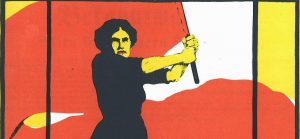 The idea and symbolism of 8 March is related to the beginnings of industrialization and the year of 1857, when the textile women workers in New York had organised themselves to draw attention to bad working conditions and low wages. The police shattered the demonstrations, but that resulted in the founding of the first women workers’ union. The protests of 8 March occurred during next decades as well, and the most massive and the most famous happened in 1908 when 15.000 women marched through New York asking for shorter working hours, better payment and the right to vote. In Copenhagen in 1910 there was the first International Women’s Conference that had been organised by the Socialist International and when, according to Clara Zetkin’s proposal, the International Women’s Day was established. The idea was that, on 8 March, women everywhere, in a more organised, massive and louder manner than usual, draw attention to the working conditions and require the rights that belong to them. In 1911 the International Women’s Day was marked by over a million people in Austria, Denmark, Germany and Switzerland, and they went out on the streets to support the right of women to work, education, to participation in political life. March of 1911 is remembered for the fire that broke out in a New York-based factory, when over 140 women workers were killed in the fire, mostly immigrants.
The idea and symbolism of 8 March is related to the beginnings of industrialization and the year of 1857, when the textile women workers in New York had organised themselves to draw attention to bad working conditions and low wages. The police shattered the demonstrations, but that resulted in the founding of the first women workers’ union. The protests of 8 March occurred during next decades as well, and the most massive and the most famous happened in 1908 when 15.000 women marched through New York asking for shorter working hours, better payment and the right to vote. In Copenhagen in 1910 there was the first International Women’s Conference that had been organised by the Socialist International and when, according to Clara Zetkin’s proposal, the International Women’s Day was established. The idea was that, on 8 March, women everywhere, in a more organised, massive and louder manner than usual, draw attention to the working conditions and require the rights that belong to them. In 1911 the International Women’s Day was marked by over a million people in Austria, Denmark, Germany and Switzerland, and they went out on the streets to support the right of women to work, education, to participation in political life. March of 1911 is remembered for the fire that broke out in a New York-based factory, when over 140 women workers were killed in the fire, mostly immigrants.
The women of Bosnia and Herzegovina organised a massive public gathering on 8 March 1913, on the International Women’s Day. That meeting turned into a protest meeting during which the gathered women demanded, first of all, economic and political liberation of women. On the meeting the complimentary telegram by Clara Zetkin was read, the one she sent in the name of the International Organisation of Women Social Democrats. In Sarajevo in 1918 it was mass marked as the public celebration of Women’s Day, where around 2000 women from all over the country and of all religious denominations gathered.
The celebration of 8 March has become a part of many countries’ cultures that inherited the idea of the importance of labor, socialist, economic and political struggle against inequality, sexism and all other injustices that come from gender inequality. The United Nations, in 1977, adopted a resolution on regular marking of 8 March as the International Women’s Day.
Sarajevo Open Centre, as a feminist organisation that advocates full respect of human rights and social inclusion of LGBTI (lesbian, gay, bisexual, trans* and intersex) persons and women, organises a series of activities that will mark this significant day and that will draw attention of the public to the burning issues that regard gender equality in Bosnia and Herzegovina.
The program of Sarajevo Open Centre for the 8 March you can find here.